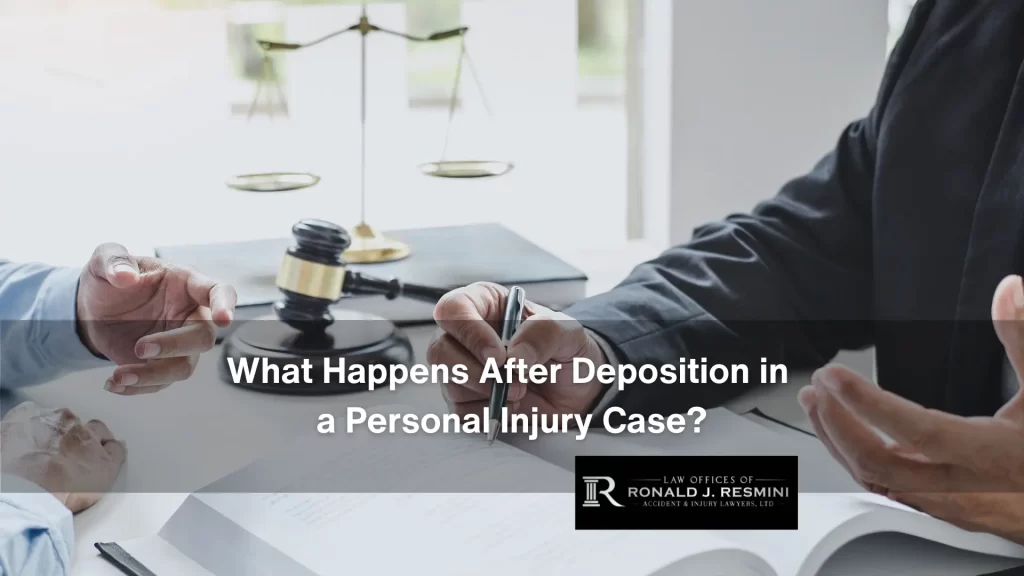 After deposition in a personal injury case, both sides will have time to negotiate a mutually-agreeable settlement. The testimony taken in a deposition should prove that the party being sued was negligent and caused the plaintiff’s injury. Depositions are part of the “discovery” phase of a trial. A debriefing session with your attorneys after the deposition should inform you of the strength of your legal position.
After deposition in a personal injury case, both sides will have time to negotiate a mutually-agreeable settlement. The testimony taken in a deposition should prove that the party being sued was negligent and caused the plaintiff’s injury. Depositions are part of the “discovery” phase of a trial. A debriefing session with your attorneys after the deposition should inform you of the strength of your legal position.
If your deposition and that of others on your side were strong, your lawyers will have more leverage to negotiate a favorable settlement. If an appropriate settlement is reached, you will sign a settlement agreement that binds the other party to compensate you for your accident-related injuries and losses. However, if the opposing party is unwilling to pay a satisfactory sum, the parties may agree to mediation or prepare for trial.
Read more: How to Know if Your Deposition Went Well
How Long After Deposition Is Mediation?
The time between the conclusion of a deposition and the start of mediation will depend on the specific facts of your case. First, mediation in personal injury cases is not mandatory in Rhode Island, so mediation might not occur at all. If you plan to engage in mediation, how soon you can schedule it could depend on the availability of mediators.
Your attorneys will assess the value of your case. Mediation allows negotiation in a less adversarial setting if the other side does not make an appropriate offer. Therefore, mediations are helpful to:
- Exhaust administrative remedies required in some claims
- Facilitate agreement after a breakdown in negotiations
- Provide information insurers may need to approve a demand
- Narrow down legal issues for both parties before trial
- Provide insight into the other side’s position and the mediator’s view
Although mediations are supposed to be “voluntary,” they may not feel that way. But do not think of mediation as a way of stalling or wearing you out. Both sides might prefer mediation, if necessary, to reach an amicable settlement. It’s a much less expensive alternative to going to court.
Time to Review Transcript of Deposition
Rhode Island allows a recording of deposition testimony through sound, audio-visual means, or stenography. When a deponent requests a stenographic transcript before the deposition is complete, the transcript will be provided if these rules are met:
- An officer shall notify the deponent that the transcript or recording is available
- The deponent has 30 days to review the transcript
- If there are changes, deponents must sign a statement explaining the reasons for the changes
You won’t file the original deposition transcript with the court. Instead, any party to the deposition can inspect the documents, and they will mark the originals or verified copies for identification.
How Long After Deposition Is Settlement
Either side can review the record and make necessary changes within 30 days from when a transcript becomes available. It may take over a month to ferret out inconsistencies and iron out differences in settlement expectations. If subsequent mediation resolves these issues, reaching a favorable settlement should not take long. However, delays might occur due to:
- Need for out-of-state travel
- New evidence from deposition
- Subpoenas for additional documents and records
- Complications from newly discovered evidence
- Discrepancies between testimony and evidence
Fortunately, both sides must conduct depositions in good faith. If one party unreasonably examines to “annoy, embarrass, or oppress” the deponent, they will face sanctions and must pay the other party’s attorney’s fees. Your attorneys may present such a motion immediately. Working on a contingency fee basis, they have no incentive to delay.
What You Can Do Between Deposition and Settlement
 You can help your lawyers by maintaining an open line of communication without pestering them. Rest assured, they are doing their utmost to aggressively negotiate a favorable settlement that covers past and future bills, attorney fees, and liens. While awaiting settlement, do not discuss the details of your case or deposition with anyone. Your attorney will first place the compensation you recover into a trust account. After deducting their fees and the relevant expenses, they will pay you the balance directly through a check or electronic transfer.
You can help your lawyers by maintaining an open line of communication without pestering them. Rest assured, they are doing their utmost to aggressively negotiate a favorable settlement that covers past and future bills, attorney fees, and liens. While awaiting settlement, do not discuss the details of your case or deposition with anyone. Your attorney will first place the compensation you recover into a trust account. After deducting their fees and the relevant expenses, they will pay you the balance directly through a check or electronic transfer.
Consult a Respected Rhode Island Personal Injury Firm
The Providence personal injury attorneys of Law Offices of Ronald J. Resmini, Accident & Injury Lawyers, Ltd. can prepare you for deposition and enhance your chances of success. This family-run firm has been negotiating settlements and representing clients successfully at trial for decades.
Contact us any time by calling (401) 751-8855 to get your free consultation today.
